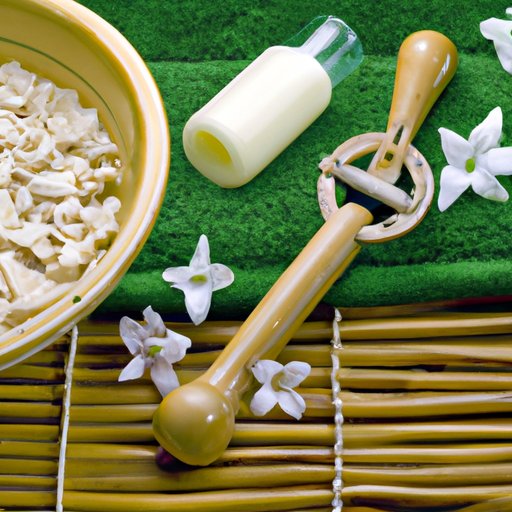
I. Introduction
Hemorrhoids, also known as piles, are swollen veins in the rectum and anus that can cause discomfort, pain, and itching. This condition affects millions of people, particularly those over the age of 50, and can be caused by factors like constipation, pregnancy, and prolonged sitting. If you’re suffering from hemorrhoids, there are many natural remedies, lifestyle changes, and treatments that can help ease your symptoms and prevent future flare-ups.
II. Natural Remedies for Treating Hemorrhoids
When it comes to treating hemorrhoids, natural remedies can be a safe and effective option. Aloe vera, witch hazel, and apple cider vinegar are three of the most popular natural remedies for hemorrhoids.
Aloe vera is known for its soothing and healing properties and can also reduce inflammation. To use, simply apply the gel from an aloe vera plant to the affected area and leave on for 15-20 minutes before washing off with warm water.
Witch hazel is a natural astringent that can help reduce swelling and itching. Apply witch hazel to a cotton pad or cloth and place on the affected area for a few minutes, then repeat as needed.
Apple cider vinegar is another natural remedy that can reduce inflammation and itching. Mix equal parts of apple cider vinegar and water, then apply to the affected area with a cotton ball. Leave on for several minutes before washing off with water.
III. Dietary and Lifestyle Changes to Prevent Hemorrhoids
Preventing hemorrhoids from occurring in the first place is key, and that can be achieved through dietary and lifestyle changes. Keeping your body well-hydrated is important, as dehydration can lead to constipation and straining during bowel movements. Adding fiber-rich foods to your diet, such as fruits, vegetables, and whole grains, can also help prevent hemorrhoids by promoting regular bowel movements.
Avoiding sitting for long periods can also reduce your risk of developing hemorrhoids. When sitting for an extended period of time, make sure to take frequent breaks and move around. Exercise is also important for preventing hemorrhoids, as it can improve circulation and promote healthy bowel movements.
Other lifestyle changes that can help prevent hemorrhoids include avoiding straining during bowel movements, not delaying the urge to go to the bathroom, and avoiding anal intercourse.
IV. Over-the-Counter Treatments for Hemorrhoids
If natural remedies and lifestyle changes are not sufficient, over-the-counter treatments can provide relief. Topical treatments like creams, ointments, and suppositories can help reduce swelling, itching, and discomfort. Pain relievers like acetaminophen and ibuprofen can also help with pain management.
When using over-the-counter treatments, it’s important to follow the recommended dosage and be aware of any potential side effects or warnings. Common side effects may include mild burning or itching, and if these persist or become severe, it’s best to consult with your doctor.
It’s also important to recognize when over-the-counter treatments are not enough and it’s time to see a doctor. If you have severe or persistent symptoms, or if you have rectal bleeding or discharge, seek medical attention right away.
V. Sitz Baths and Other Home Remedies
In addition to natural remedies and over-the-counter treatments, there are various home remedies that can help ease hemorrhoid symptoms. Sitz baths, which involve sitting in a shallow bath of warm water for 10-15 minutes, can help reduce inflammation and pain. Adding Epsom salt or baking soda to the water can enhance the healing properties of the sitz bath.
Warm compresses and gentle massage can also help ease pain and swelling. Applying a warm compress to the affected area for 10-15 minutes several times a day can provide relief. Gently massaging the area with a cloth or clean finger can also increase circulation and reduce inflammation.
Other at-home treatments to relieve hemorrhoid symptoms include using ice packs, wearing loose-fitting clothing, and using a donut-shaped cushion when sitting for extended periods of time.
VI. Surgical Options for Severe Hemorrhoids
In severe cases of hemorrhoids, surgery may be necessary. This may include procedures like hemorrhoidectomy, in which the hemorrhoids are surgically removed, or rubber band ligation, in which a rubber band is placed around the base of the hemorrhoid to cut off circulation and cause it to shrink and fall off.
While surgery is generally reserved for severe cases, it’s important to be aware of the risks and potential complications associated with these procedures. Recovery periods can vary depending on the type of surgery and the individual patient, but most people can expect some discomfort and bleeding in the days following surgery.
VII. Conclusion
Dealing with hemorrhoids can be an uncomfortable and sometimes painful experience, but with the right natural remedies, lifestyle changes, and treatments, you can reduce your symptoms and prevent future flare-ups. It’s important to stay well-hydrated, eat a balanced diet rich in fiber, and avoid sitting for long periods of time. Over-the-counter treatments can provide relief, but it’s important to be aware of the recommended dosage and potential side effects. If symptoms persist or become severe, don’t hesitate to seek medical attention. With proper care and treatment, you can say goodbye to hemorrhoids and enjoy an improved quality of life.




